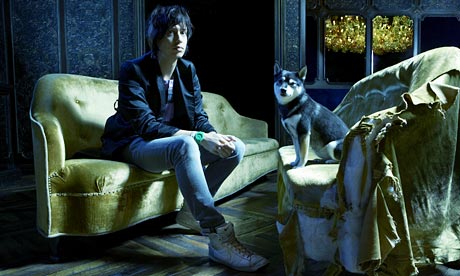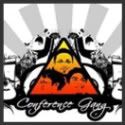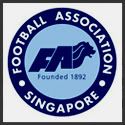Gaby Wood
The Observer, Sunday 4 October 2009

Julian Casablancas, The Griffin, Manhattan, September 2009. Photograph: Neil Wilder
When I turn up to meet Julian Casablancas, he is having his picture taken in a bar that's not yet a bar. Drills are whirring, workmen are heaving baroque sofas about in the half-light, while the lead singer of the Strokes, now launching his solo career, has silently become part of the fabric. In a blue velvet-upholstered wall there is a deep, square indentation; he is sitting scrunched up in it, wearing sunglasses. He has dyed black hair with an orange-blond streak, ruffled forward over a face of almost childlike pallor. He rests his forearm on his knee, inclines his head and closes his eyes. The effect is surreal: a basketball-booted porcelain doll in a luxurious padded cell.
Afterwards, Casablancas and Voltron, his dog (a shiba inu named after a Japanese animé series he liked as a kid), wander with me out into Manhattan's Meatpacking District. Sometimes, Casablancas says, all of New York feels like Times Square to him. He moves slowly among the busy city crowd, like the only person in focus in a long-exposure photograph. He's had a bit of a disorientating day. He was working in a studio around the corner from here until 5am, then he went home to the East Village to catch a couple of hours' sleep before doing an interview with Zane Lowe on Radio 1.
And by the way, he feels bad about that. He was asked if he missed performing and he said no, which was kind of an asshole-ish thing to say. He didn't really mean no, and if he'd had more time to think about it he would have said "Yes, but…" He would have been able to describe that feeling of really missing it, and then right before you go on stage just wanting to be at home watching TV. But on the radio, you just have to give an answer, fast. Do you ever get that thing, I say, where your mind goes completely blank?
As soon as I've said it, I realise this is quite possibly one of the stupidest questions one can ask of a rock star.
Casablancas looks down at Voltron (who is making a meticulous investigation of the gutter), shakes his head, then looks back up at me with a broad, slow-breaking grin.
"All the time," he says.
Regarded as the most exciting thing to have come out of New York since the CBGBs scene of the mid-1970s, the Strokes released their first album, Is This It, in 2001. Everything about them seemed perfect – the fizzy throwback sound, the jackets, the shaggy hair, the fact that they had met in posh schools around the world. They became the band that launched a thousand imitators, not least Kings of Leon, who were once billed as "the southern Strokes".
Of the band's five members, Casablancas – the singer and chief songwriter – was the mystery observers most wanted to crack. He was often self-critical, mostly drunk, and had all manner of unpredictable musical influences. Things are different now (though his influences are just as hard to predict – when asked which song he would most like to have written, he cites a funeral march by Benjamin Britten). He's sober, his own much-awaited album, Phrazes For the Young, is coming out, and his wife, Juliet, is five months pregnant.
"Lately," he says after we've found a diner to sit in, "everything feels very… both weird and exciting. So I try not to think about it that much. I'll assess it a little later on and then see which one took hold, the weirdness or the excitement."
Also, he's considering a move. Far away, like the forest, or a beach. "Hawaii," he says. "If I could get everyone I knew to move to Hawaii…"
How many people would have to move to Hawaii before you'd move to Hawaii, I ask.
"Um," he says, "probably about six to eight."
So, that's all of the Strokes, your wife…
"No, actually, the Strokes would be a deal breaker." Casablancas smiles. "I'm kidding."
There were rumours that the Strokes would split as early as 2002. Although they released Room on Fire in 2003 and First Impressions of Earth in 2006, their critical momentum was slipping and they have been on a sabbatical ever since. Casablancas is reluctant to dwell on the reasons why, though he does concede that "a lot of things" have been involved. "Stylistically," he goes on, "I think I used to do everything and then people had a problem with that within the band, so we're doing more of a communal thing."
The inference from this is that the band have recently started to work together again in a new way, and a new Strokes record is supposedly on the cards. Meanwhile, Casablancas can do his own thing on his own.
I ask him if he's a control freak.
"Not any more with the Strokes," he insists.
But were you?
"Was I? Not a control freak. I mean, I guess you could say I'm a bit of a perfectionist.... With the Strokes now it's... in a minute it'll be about everything being great, but this second, it's about everyone being happy. If we can get to that point, I think the rest will fall into place."
And how far off is that?
"It felt super-duper close… then it was postponed again, not by me. It's going to be great, it's just: to get everyone back, in the same spot, and feeling good, is tricky. But we're working on it."
As for his own work, Phrazes For the Young – a fun, stylistically diverse and often lovely album – should allow people to look at Casablancas in a new way. The title, incidentally, was inspired by a book by Oscar Wilde, though, in habitual undercutting mode, Casablancas claims only to have read two books from cover to cover – The Odyssey and Crime and Punishment.
The first song he wrote for the album was Ludlow Street. "Everything seems to go wrong when I stop drinkin'/ Everything seemed to go my way last night", he sings. "Nauseous regrets/ They're calling me on the phone/ My shoes seem to be my only home".
Casablancas doesn't drink at all now – sometimes, he jokes, "I'll order something cheesy and pretend it's for someone else – 'He'll have a virgin pina colada!'" – but there was a time when he was physically sick if he didn't drink. When he gave up, he says, he had a hangover that lasted two years.
Now, he says: "I'm happy. I'm like a happy person. Everything feels like it's on the right track, where in the past it felt like a random track… I kind of lost control."
In the past, he has suggested that he inherited regrettable habits from his father, John Casablancas, the founder of the Elite model agency. He married Julian's mother (Jeanette Christiansen, a model and former Miss Denmark), they moved from Paris to New York, and when Julian was six his father had a well-publicised affair with Stephanie Seymour, who was 16 at the time. One might imagine that the younger Casablancas might seek to live in contrast to that, but now Casablancas, to his credit, won't be rude about his dad. He says they get on "great".
He started drinking before he was a teenager, cadging tequilas at 9am, to the point where he was enrolled in an after-school programme that was a form of rehab. Later, he went to a boarding school in Switzerland (he met Albert Hammond Jr of the Strokes there), and dropped out of a high school back in New York (where he met Fabrizio Moretti and Nick Valensi). He describes his upbringing as being "kind of like that movie, Kids".
The greatest positive influence on his life has been his stepfather, Sam Adoquei, a classical painter who taught his mother and entered his life just in time to hand Casablancas a cassette of a Doors album. "He's the wisest person," Casablancas says of Adoquei. "Everything positive I've ever done I feel I owe to him."
What did you grow up listening to before then, I ask.
"Phil Collins."
Casablancas grins. "You know, he's back in fashion now."
From the beginning, with the Strokes, the aim was to make Velvet Underground-calibre music that would be mainstream and thereby raise the bar for mainstream culture altogether. "You know they always say: instead of making important things interesting, you should make interesting things important?" he muses.
In the hours that we spend together, he comes across as an ironic dreamer: romantic, funny, faintly old-fashioned – elusive not because he's avoiding you but only to the extent that he lives in his head; a person who really does want to heal the world but will cut himself off before he finishes any sentence that smacks of pretension or prescription.
"My heroes are like Benjamin Franklin," he says at one point, "who did a whole bunch of weird shit. I don't know, I want to invent random things. I'm saying too much. I feel embarrassed. Everything is at such an early stage… But I feel like right now the best thing I can do is do music, and maybe that's all I'll ever do, and that's fine, but… yeah."
Phrazes for the Young is released on 19 October




There has been 0 Responses to 'Julian Casablancas:' so far
Post a Comment